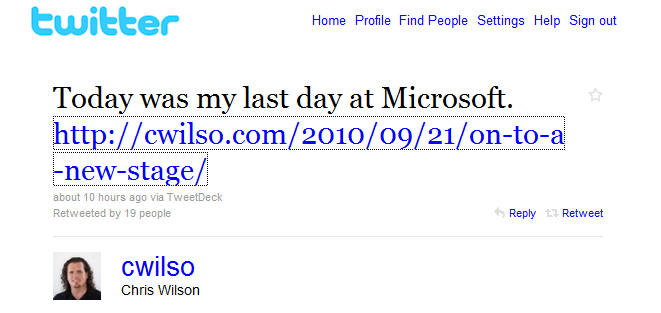Chris Wilson trades his Microsoft Web-platform hat for a Google one

A long-time member of Microsoft's Internet Explorer team, Chris Wilson, has left Microsoft and is joining Google in November.
Wilson's move is more than "yet another Microsoft guy goes Google." Although Wilson didn't burn any bridges in his September 21 goodbye blog post, he made it clear that Google's strategy to advance the Web as a platform is where he sees the action happening.
Wilson said he is taking a month off and then will be joining Google as a Developer Advocate, working out of Google's Fremont, Wash., offices.
"I’ll spare the minor details of my decision (other than how excited I am to turn my Office Space style commute into a 6 mile bike ride to Google’s Fremont office), and just say I’m very excited to work for a company that invests so much in making the Web platform better for developers and consumers, and I hope that I can use this as an opportunity to not only do no evil, but to actively do good," Wilson blogged.
Wilson joined the IE team back in 1995, has spent a lot of his time on the hot seat, representing Microsoft on various standards groups. As of mid-2009, Wilson was Principal Program Manager of the Open Web Platform in Microsoft's Developer Division. At that time, he was working for the browser programmability and tools unit, which was the team building the "Chakra" JavaScript engine and tools for Internet Explorer 9.
Wilson told me a year ago that Microsoft was working to create a more unified Web platform vision and strategy, giving higher priority to the tools and runtime APIs (application programming interfaces) for the Web.
The open Web platform is not a single, definable entity, Wilson said. “But to me, it’s CSS, HTML 5, JavaScript and other APIs developed by the W3C,” Wilson told me a year ago.
IE 9 will be Microsoft's most standards-compliant and fastest version of its browser when it is released (most likely in the first half of 2011). So maybe Wilson saw his work at Microsoft as done. I think the Redmondians still have a long way to go before Microsoft ever has the same commitment and support for Web development as it does for Windows development....
